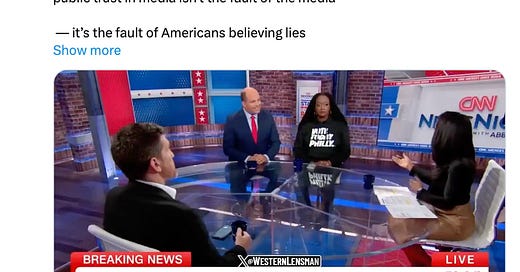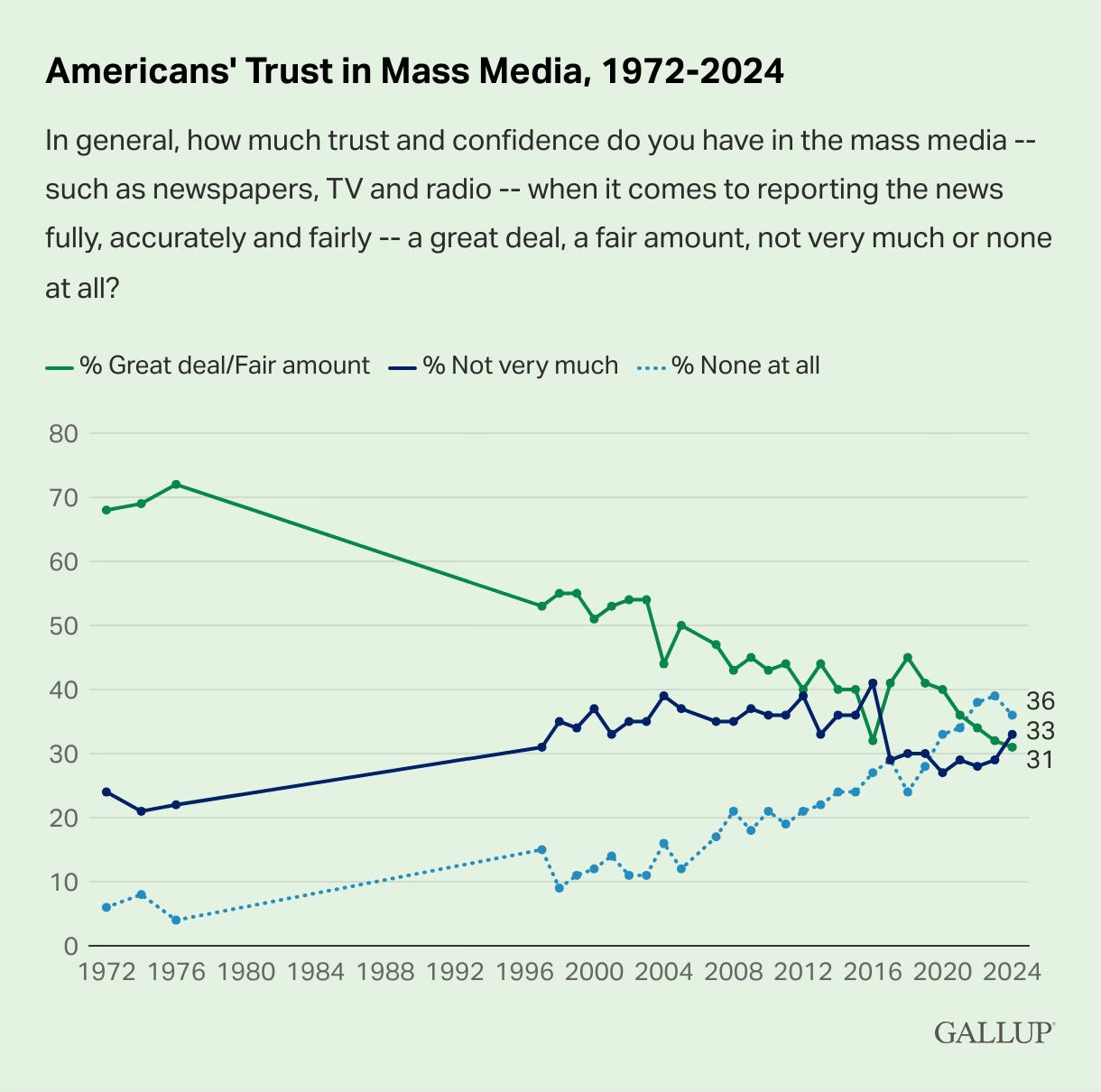The Pendulum: Media Trust, Propaganda, and Cultural Self-Correction // Variant Perception #51
As America digests the shift to a Trump White House, my highest hope is that every citizen creates a moment for self-reflection
My biggest hope is that the mainstream media will take this opportunity for self-reflection. Let’s check in on how they’re doing…
Oh, well, I cannot be too shocked that organizations that have used gaslighting and obfuscation to advance their agendas have continued to use these self-defeating behaviors.
The latest Gallup poll shows a continued decline in trust in mass media. We’ve hit another record low since polling began 52 years ago. Only 31% of Americans trust mass media today, down from 70% at the start, and the majority of that 31% identify as Democrats.
I’d argue the opposite of what many predict about a continued decline in trust. We’re entering the initial phase of rebuilding trust in media, but the future is not guaranteed to look like the past.
A critical institution like media can’t be dysfunctional for long before a free society corrects it. This pendulum swing can be hard to predict or take longer than expected. Behaviors become more extreme than anticipated and then rapidly change under high pressure.
I believe we’re entering one of those phases.
Recent Tech Leadership
“The Media” is now a technology business. The three most prominent names in media are Mark Zuckerberg, Elon Musk, and Jeff Bezos. Only Jeff Bezos owns and operates a “traditional” media outlet, but his wealth and influence place him on this list.
All three influential people have recently influenced American and global media into the 2020s and beyond.
Elon’s Twitter was the only mass online platform without direct censorship, specifically of voices on the American right. Elon has been a champion for free speech, and X is where independent journalists can publish investigations and content without fear of censorship.
Zuck has gone from enemy #1 for free speech to regaining trust. His recent open letter to House Representative Jim Jordan exemplifies the shift.
In 2020 and 2021, Meta censored dissenting views at the direction of the Biden White House and Intelligence Agencies regarding COVID-19 and the Hunter Biden Laptop. Zuck’s recent letter indicated no further cooperation with any government agency for speech censorship (Meta will follow their guidelines).
Jeff Bezos wrote an open letter in The Washington Post, stating the paper will no longer endorse political candidates. He said, “Most people believe the media is biased. Anyone who doesn’t see this is paying scant attention to reality, and those who fight reality lose. Reality is an undefeated champion.” I couldn’t agree more, Jeff.
America currently has a herding culture. Most people wait until it’s safe to admit a dissenting belief because doing so carries reputational and social risk.
While I don’t want to ascribe too much influence to three people, their actions represent a shift towards a “safe” belief. Traditional media has failed this country, causing polarization and demonization and reinforcing false narratives, demagoguery, and political bias. The recent shaming and blaming of left-wing media after the Kamala defeat exemplify this.
Without a self-reflective mechanism, all institutions will crumble under their weight. The Trump win signifies the shift needed to restore trust and faith in our media institutions, at least the ones that survive.
This phenomenon isn't unique to our time. Media has shifted before and will continue to do so. While today's media transformation is technology-driven, media distrust and correction cycles have occurred throughout American history.
Historical Shifts in Media
Three examples represent shifts when trust in media has declined in modern history: the 1890s “Yellow Journalism,” the McCarthy era, and the Watergate scandal. Each decline led to a solution and transformation, critical aspects of a market economy. When companies or institutions fail, the market recognizes and punishes them by removing resources.
In the 1890s, media giants William Randolph Hearst and Joseph Pulitzer pioneered "yellow journalism," sensationalizing stories to boost circulation. Their inflammatory coverage pushed America into the Spanish-American War, demonstrating the dangerous power of unchecked media influence.
The McCarthy era of the 1950s showed how media could amplify baseless accusations, with most outlets initially supporting Senator McCarthy's communist witch hunt. It wasn't until Edward R. Murrow's stand on CBS that the tide began to turn, teaching journalists the lesson of questioning authority.
The Watergate scandal, initially dismissed as a minor break-in, became a watershed moment for journalism thanks to the Washington Post's investigation. This established the vital role of investigative journalism as a check on government power, a lesson echoed in today's coverage of Hunter Biden's laptop.
Media distrust is not new or permanent. Crisis and failure in a market economy lead to reforms, new ideas, and new mediums.
The Path Forward
What does the future hold? The media must achieve a few goals to create and maintain trust.
Media and journalism must tell stories and answer questions at the heart of the truth in their culture. Lying and gaslighting can bring short-term success but long-term loss. Eventually, everyone gets caught in the lie.
The media must hold the powerful accountable by investigating corruption, bad actors, and fraud in the highest halls of power. Trust in the media can only exist if journalism and reporting remain independent from the most powerful elements of government and industry.
What about social media and user-generated content? In the last 10 years, censorship has been the preferred tool of social media companies, including on Meta and FKA Twitter. How will that evolve?
X now uses a Community Note feature. X users submit notes on content that the community rates and the top notes appear under the original post. No user is immune from getting noted, and it’s an effective way to fact-check, add context, and correct ill-informed or deceiving content. Even X advertisements can and do get community noted.
The Ouroboros is Undeferated
As I said, human culture is terrible at predicting and timing paradigm shifts. We easily project a trend into the future but struggle to notice the seeds of doubt and change it creates as it progresses.
I believe we’ve entered the final death rattle of traditional media as we’ve seen it and, simultaneously, have begun the repair phase led by new forms like social media, independent journalism, and podcasting. The pressure to correct has become too strong. Eventually, major news organizations like the New York Times and Washington Post will adapt. If they don’t, they will die.
Then, in time, the cycle will repeat as usual.
-Jared






"Democracy Dies in Darkness"- R.I.P. Washington Post